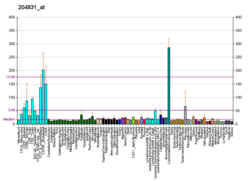Clinical significance
CDK8 is a colorectal cancer oncogene: the CDK8 gene is amplified in human colorectal tumors, activating β-catenin-mediated transcription that drives colon tumorigenesis. [16] However, CDK8 may not be oncogenic in all cell types, and indeed may act as a tumor suppressor in the notch and EGFR signaling pathways. Specifically, CDK8 promotes turnover of the notch intracellular domain, [9] and inhibits EGFR signaling-driven cell fates in C. elegans . [13] Thus, CDK8 may be an oncogene in cancers driven by Wnt/β-catenin signaling, but could instead be a tumor suppressor gene in cancers driven by notch or EGFR signaling. In addition, CDK8 promotes transcriptional activation mediated by the tumor suppressor protein p53, indicating that it may have an important role in tumor suppression [17] Further research is needed to delineate the effects of CDK8 inhibition in different tissues, so for the time being, drugs targeting CDK8 for cancer treatment remain untested in humans.
An autosomal dominant syndrome has been described that is associated with mutations in the ATP binding pocket of the kinase domain. [18] The clinical features include agenesis of the corpus callosum, mild to moderate intellectual disability, hypotonia, seizures, hearing or visual impairments, behavioral disorders, variable facial dysmorphism, congenital heart disease and ano-rectal malformations.
This page is based on this
Wikipedia article Text is available under the
CC BY-SA 4.0 license; additional terms may apply.
Images, videos and audio are available under their respective licenses.




